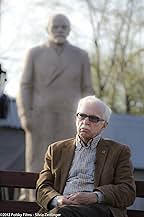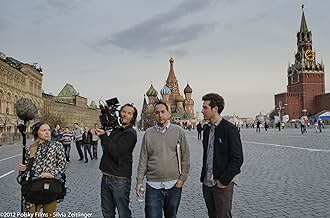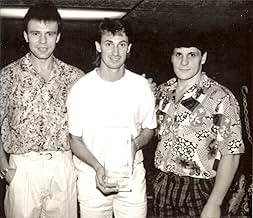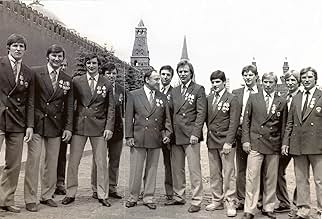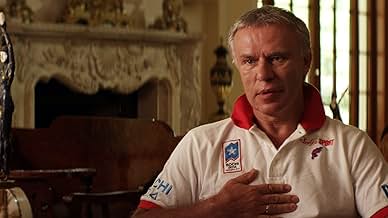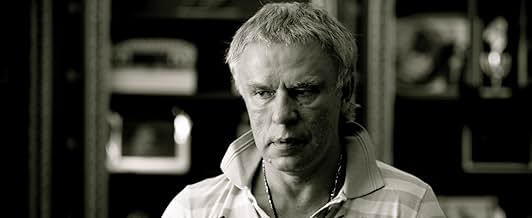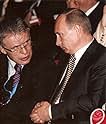IMDb रेटिंग
7.6/10
7.3 हज़ार
आपकी रेटिंग
अपनी भाषा में प्लॉट जोड़ेंThe story of the Soviet Union's famed Red Army hockey team through the eyes of its players.The story of the Soviet Union's famed Red Army hockey team through the eyes of its players.The story of the Soviet Union's famed Red Army hockey team through the eyes of its players.
- पुरस्कार
- 5 जीत और कुल 11 नामांकन
Viacheslav Fetisov
- Self
- (as Slava Fetisov)
Herb Brooks
- Self - US Olympic Coach
- (आर्काइव फ़ूटेज)
- (वॉइस)
Don Cherry
- Self - Hockey Commentator
- (आर्काइव फ़ूटेज)
- (वॉइस)
फ़ीचर्ड समीक्षाएं
Greetings again from the darkness. You need not be a hockey fan to be familiar with the "Miracle on Ice" upset of the seasoned Russians by the upstart Americans at the 1980 Olympics in Lake Placid. Often referred to as a battle of cultures – "our way vs their way, capitalism vs communism" – most articles, TV shows, and movies have been presented from the American perspective. It's only now, in this informative and entertaining documentary from filmmaker Gabe Polsky, that we gain some insight into the Russian players and their way of life.
Mr. Polsky is the son of Russian immigrants, and grew up playing hockey in Chicago and later for Yale. His research into Russian hockey evolved into a documentary that blends sports, geopolitics, history, culture, and personal stories. He mixes in some fantastic archival film footage from the 1970's and 80's, but the heart of everything here flows from the interviews with Russian hockey legend Vyacheslav Fetisov, who is a vital and unique link to past and present.
Fetisov is sometimes playful and sometimes snide in his remarks, but he basically narrates the history of Russian hockey – starting with Stalin's founding of the organization, through the two key coaches: father figure Tarasov and the militant Tikhanov who followed. Stalin was convinced that Russian domination of global sports would clearly establish communism and the Russian culture as far superior to capitalism and the carefree ways of the west. This led to the Red Army hockey camps being run by the military. The players were isolated for eleven months each year, training and playing in a manner that generated ultimate teamwork, but also quite unhappy young men.
We see the influence of Russian chess (Karpov) and the Bolshoi ballet for training methods, and we also see the ever-present KGB ensuring no "escapes", or what we might know better as defections. We learn about the Russian Five (including Fetisov) who were so dominant that the team went two years without losing. Gold medals in Sarajevo (1984) and Calgary (1988) occurred just prior to the 1991 dissolution of the U.S.S.R. and the economic crisis of the region.
This is what opened the door for Russian hockey players to enter the NHL, though the transition was smoother for some than others. After a few years of adjusting, it was coach Scotty Bowman's 1997 Detroit Red Wings that won the Stanley Cup with a contingency of Russian players (including Fetisov) who were given free reign to play their own game while on the ice. Their movements and intricate teamwork clashed mightily with the individualistic style of westerners and that group of Russian players can be credited with helping the game to evolve to its current style.
Much of the insight comes from the faces of the men who are interviewed. Their stoicism and lack of emotion is a microcosm of the society in which they were raised. Their country was obliterated by war, and then led by a megalomaniac who wanted to rule the world. Human emotion and the rights of individuals mattered little, and we see that despite the years of hardship, these players remain (mostly) true and loyal to their country. This is a fascinating look at human nature and how the culture of one's youth can directly impact the beliefs as an adult, so many years later.
Mr. Polsky is the son of Russian immigrants, and grew up playing hockey in Chicago and later for Yale. His research into Russian hockey evolved into a documentary that blends sports, geopolitics, history, culture, and personal stories. He mixes in some fantastic archival film footage from the 1970's and 80's, but the heart of everything here flows from the interviews with Russian hockey legend Vyacheslav Fetisov, who is a vital and unique link to past and present.
Fetisov is sometimes playful and sometimes snide in his remarks, but he basically narrates the history of Russian hockey – starting with Stalin's founding of the organization, through the two key coaches: father figure Tarasov and the militant Tikhanov who followed. Stalin was convinced that Russian domination of global sports would clearly establish communism and the Russian culture as far superior to capitalism and the carefree ways of the west. This led to the Red Army hockey camps being run by the military. The players were isolated for eleven months each year, training and playing in a manner that generated ultimate teamwork, but also quite unhappy young men.
We see the influence of Russian chess (Karpov) and the Bolshoi ballet for training methods, and we also see the ever-present KGB ensuring no "escapes", or what we might know better as defections. We learn about the Russian Five (including Fetisov) who were so dominant that the team went two years without losing. Gold medals in Sarajevo (1984) and Calgary (1988) occurred just prior to the 1991 dissolution of the U.S.S.R. and the economic crisis of the region.
This is what opened the door for Russian hockey players to enter the NHL, though the transition was smoother for some than others. After a few years of adjusting, it was coach Scotty Bowman's 1997 Detroit Red Wings that won the Stanley Cup with a contingency of Russian players (including Fetisov) who were given free reign to play their own game while on the ice. Their movements and intricate teamwork clashed mightily with the individualistic style of westerners and that group of Russian players can be credited with helping the game to evolve to its current style.
Much of the insight comes from the faces of the men who are interviewed. Their stoicism and lack of emotion is a microcosm of the society in which they were raised. Their country was obliterated by war, and then led by a megalomaniac who wanted to rule the world. Human emotion and the rights of individuals mattered little, and we see that despite the years of hardship, these players remain (mostly) true and loyal to their country. This is a fascinating look at human nature and how the culture of one's youth can directly impact the beliefs as an adult, so many years later.
When we first meet Viacheslav Fetisov in the opening scene of "Red Army", he rather surprisingly gives his interviewer the middle finger. He's not going to be hurried - he's already seen everything; been everywhere and done it all to be rushed by some kid from California (or was it Chicago?) making a documentary about ice hockey. If he has to sort out some personal business by way of a phone call before he gets into the nitty-gritty of his life story, then he will.
This is all before he has even uttered a word of genuine substance. By the time he has stopped speaking, and the film has ended with his life as it was in aftermath of the 2014 Winter Olympics, we have surely been moved by a quite stupendous narrative depicting one man's journey through the very heart of the Russian ice hockey system at a time when it was looked upon by the Communist ideologues in the 1970's and 80's as a bulwark for internationalist reputation.
There is not, of course, any correlation between sporting success and kind; prosperous societies which are worth living in, but it is, as George Orwell once attempted to convey in a work which unfolded in a mock-USSR setting, the case that something certainly becomes true when enough people believe it - irrespective of whether that thing is true in reality.
Despite their terrifying nature, societies (and films about these societies) along the lines of the Soviet Union are, for whatever reason, often morbidly fascinating - more so once we know they have disbanded and can gawp on in awe at what life was like within them: don't tell me you've never found a documentary about Nazi Germany absorbing, or even more recently a programme about a television crew who were escorted around North Korea by government supervisors. "Red Army" is, in one sense, a piece along these lines, but it is predominantly more interested in the historical story of the development of Russian ice hockey to such an extent it became all but invincible, and the aftershock of the programme which it had on other ice hockey playing nations.
Going on what I read from those who lived there, the Soviet Union was not a good place to be: people were poor, but power brought you the privilege of a nice apartment and good healthcare; government officials were corrupt and could be bribed quite easily. The skylines were desolate and grey, scarred by buildings beyond repair. It was a society of lies and corruption, not one of peace; love; progress and equality. Its saddest story is the tale of young Pavlik Morozov, who grassed to the Stalinist authorities the fact his parents were hoarding grain. His parents were killed, and a statue went up in a town square of the boy who was seen as an example to all. The odd nature of the country and how its rulers secretly knew it was a bad place to be is nicely captured via a short story therein the documentary, which recalls how KGB agents would confiscate the passports of hockey players in order to prevent defections once they had arrived at their foreign destination. Why would anyone want to defect from the Soviet paradise?
The country's ice hockey, however, eventually became second to none and "Red Army" is the retrospective documentation of the process which had this come to be; a quite brilliant voyage through the Soviet system told from the perspective of many of the players involved in the team in conjunction with one or two supporting acts who played witness to the whole thing. Agonisingly, we are robbed of input from Viktor Tikhonov, the coach of the Soviet team whose team waltzed to so many gold medals and whose nerves must have been shredded every match as the weight of both his nation's ideology and standing bear down on him. Agonisingly, he died shortly after the release of the documentary anyway.
The documentary is expertly put together by, of all people, an American by the name of Gabe Polsky, who depicts how no one had played ice hockey before what the USSR brought to the game in the 1970's. It depicts them using the somewhat obscure combination of the rhythm of ballet and the tactical nous of chess to create a team which blasts their way into greatness, winning the vast majority of their finals and seemingly spoiling the lofty opinions certain western powerhouses had of themselves in the process. Do not let the tough nature of the sale put you off - this combination of the Soviet Union and ice hockey wrapped up into a documentary package works really well.
This is all before he has even uttered a word of genuine substance. By the time he has stopped speaking, and the film has ended with his life as it was in aftermath of the 2014 Winter Olympics, we have surely been moved by a quite stupendous narrative depicting one man's journey through the very heart of the Russian ice hockey system at a time when it was looked upon by the Communist ideologues in the 1970's and 80's as a bulwark for internationalist reputation.
There is not, of course, any correlation between sporting success and kind; prosperous societies which are worth living in, but it is, as George Orwell once attempted to convey in a work which unfolded in a mock-USSR setting, the case that something certainly becomes true when enough people believe it - irrespective of whether that thing is true in reality.
Despite their terrifying nature, societies (and films about these societies) along the lines of the Soviet Union are, for whatever reason, often morbidly fascinating - more so once we know they have disbanded and can gawp on in awe at what life was like within them: don't tell me you've never found a documentary about Nazi Germany absorbing, or even more recently a programme about a television crew who were escorted around North Korea by government supervisors. "Red Army" is, in one sense, a piece along these lines, but it is predominantly more interested in the historical story of the development of Russian ice hockey to such an extent it became all but invincible, and the aftershock of the programme which it had on other ice hockey playing nations.
Going on what I read from those who lived there, the Soviet Union was not a good place to be: people were poor, but power brought you the privilege of a nice apartment and good healthcare; government officials were corrupt and could be bribed quite easily. The skylines were desolate and grey, scarred by buildings beyond repair. It was a society of lies and corruption, not one of peace; love; progress and equality. Its saddest story is the tale of young Pavlik Morozov, who grassed to the Stalinist authorities the fact his parents were hoarding grain. His parents were killed, and a statue went up in a town square of the boy who was seen as an example to all. The odd nature of the country and how its rulers secretly knew it was a bad place to be is nicely captured via a short story therein the documentary, which recalls how KGB agents would confiscate the passports of hockey players in order to prevent defections once they had arrived at their foreign destination. Why would anyone want to defect from the Soviet paradise?
The country's ice hockey, however, eventually became second to none and "Red Army" is the retrospective documentation of the process which had this come to be; a quite brilliant voyage through the Soviet system told from the perspective of many of the players involved in the team in conjunction with one or two supporting acts who played witness to the whole thing. Agonisingly, we are robbed of input from Viktor Tikhonov, the coach of the Soviet team whose team waltzed to so many gold medals and whose nerves must have been shredded every match as the weight of both his nation's ideology and standing bear down on him. Agonisingly, he died shortly after the release of the documentary anyway.
The documentary is expertly put together by, of all people, an American by the name of Gabe Polsky, who depicts how no one had played ice hockey before what the USSR brought to the game in the 1970's. It depicts them using the somewhat obscure combination of the rhythm of ballet and the tactical nous of chess to create a team which blasts their way into greatness, winning the vast majority of their finals and seemingly spoiling the lofty opinions certain western powerhouses had of themselves in the process. Do not let the tough nature of the sale put you off - this combination of the Soviet Union and ice hockey wrapped up into a documentary package works really well.
"Do you believe in miracles?! YES!!" That was sportscaster Al Michaels' immortal exaltation at the end of the 1980 Olympic hockey game which became known as "The Miracle on Ice". An American team of amateur and college hockey players had defeated the vaunted team from the Soviet Union, which had won the gold medal in the last four Winter Olympics and six of the last seven. The U.S. team would go on to win the gold medal by defeating Finland. The highly improbable American victory over the Russians was named by Sports Illustrated as the greatest sports moment of the 20th century and spawned a TV movie, a documentary film and the 2004 feature "Miracle" starring Kurt Russell. But what of the Soviet team? How did this shocking loss affect them? And was this the beginning of the end for Russian dominance of international ice hockey? The documentary "Red Army" (PG, 1:25) answers those questions and many more as it delves into the stories of the men behind the hockey masks and the dramatic history of their national sport.
The story of the Soviet Red Army hockey program is one of athletic, social, political and military influences that reflected the larger phenomenon of the Cold War and dictated the fates of those involved. This film contains the kind of interviews that you'd expect from such a documentary and also uses little-seen archival footage, creative modern graphics and skilled editing to tell this story in a very engaging way. The main interviewee is Soviet team captain Viacheslav Fetisov who describes his story as it felt back then and apparently still feels today. Interviews with his wife, his former teammates, a former KGB agent and a few journalists tell of their experiences and give valuable color commentary, but just as revealing is what is NOT said in the documentary. Co-producer, director, writer and interviewer Gabe Polsky is smart enough to turn the camera on early, keep it rolling and edit into the film the honesty and emotion that shows itself in the candid moments and unguarded reactions of his interviewees.
The film's scope covers over four decades of the Soviet Union's hockey program, but focuses mainly on the 1980s, a decade which began with Cold War tensions heightened by the Soviet invasion of Afghanistan and ended with the rapid decline of the USSR as a unified state. During this period, Fetisov and his teammates absorbed that crushing Olympic defeat, dealt with the changes that followed, rose to new challenges and, eventually, began to consider careers in the NHL, as the Soviet government gradually loosened its strong grip on its players, just as it began losing control of its people and its empire. Polsky uses all the tools at his disposal to illustrate how the Russians ran their program and what that program meant to the country. We see children from all over their massive and diverse nation training, playing and competing within the program. We observe "the best of the best of the best", as one interviewee describes them, transition from hockey players to Russian icons, and cogs in the Soviet Union's propaganda machine. We learn that these elite players were to place hockey above literally everything else in their lives. We come to understand that their purpose was to embody the superiority of their communist system. We get to peek behind the Iron Curtain and contemplate an untold story unlike any other in sports.
"Red Army" doesn't just reveal the untold story of the Soviet Union's ice hockey program, but helps us see that the men involved were more than their government's propaganda puppets, but were human beings with desires for their lives, both common and uncommon problems, and impressive amounts of talent and work ethic. This is a documentary that feels like a drama. The film brings openness to a notoriously closed system and tells a story that most audience members have never thought about, but will be unable to avoid thinking about after seeing this movie. The only weak spot I noticed was the soundbites of the director's amateurish interviewing techniques. That aside, this is a fascinating film which raises the bar for future documentaries of its kind. "A-"
The story of the Soviet Red Army hockey program is one of athletic, social, political and military influences that reflected the larger phenomenon of the Cold War and dictated the fates of those involved. This film contains the kind of interviews that you'd expect from such a documentary and also uses little-seen archival footage, creative modern graphics and skilled editing to tell this story in a very engaging way. The main interviewee is Soviet team captain Viacheslav Fetisov who describes his story as it felt back then and apparently still feels today. Interviews with his wife, his former teammates, a former KGB agent and a few journalists tell of their experiences and give valuable color commentary, but just as revealing is what is NOT said in the documentary. Co-producer, director, writer and interviewer Gabe Polsky is smart enough to turn the camera on early, keep it rolling and edit into the film the honesty and emotion that shows itself in the candid moments and unguarded reactions of his interviewees.
The film's scope covers over four decades of the Soviet Union's hockey program, but focuses mainly on the 1980s, a decade which began with Cold War tensions heightened by the Soviet invasion of Afghanistan and ended with the rapid decline of the USSR as a unified state. During this period, Fetisov and his teammates absorbed that crushing Olympic defeat, dealt with the changes that followed, rose to new challenges and, eventually, began to consider careers in the NHL, as the Soviet government gradually loosened its strong grip on its players, just as it began losing control of its people and its empire. Polsky uses all the tools at his disposal to illustrate how the Russians ran their program and what that program meant to the country. We see children from all over their massive and diverse nation training, playing and competing within the program. We observe "the best of the best of the best", as one interviewee describes them, transition from hockey players to Russian icons, and cogs in the Soviet Union's propaganda machine. We learn that these elite players were to place hockey above literally everything else in their lives. We come to understand that their purpose was to embody the superiority of their communist system. We get to peek behind the Iron Curtain and contemplate an untold story unlike any other in sports.
"Red Army" doesn't just reveal the untold story of the Soviet Union's ice hockey program, but helps us see that the men involved were more than their government's propaganda puppets, but were human beings with desires for their lives, both common and uncommon problems, and impressive amounts of talent and work ethic. This is a documentary that feels like a drama. The film brings openness to a notoriously closed system and tells a story that most audience members have never thought about, but will be unable to avoid thinking about after seeing this movie. The only weak spot I noticed was the soundbites of the director's amateurish interviewing techniques. That aside, this is a fascinating film which raises the bar for future documentaries of its kind. "A-"
"Ninety percent of hockey is mental and the other half is physical." Wayne Gretsky
In Gabe Polosky's expert documentary, Red Army, the understanding of modern Russian hockey history filters through the influence of legendary coach Anatoly Tarasov. He taught young and old about how to play hockey like chess layered over with the best of communist collectivist philosophy—a blueprint for world-class teamwork dominance from 1954-91.
The star of this doc is Vyacheslav Fetisov ("Slava"), whose play, along with four other Russian teammates, dominated world hockey for years. His face full of character in middle age, his understanding of human nature, and his devotion to the best of what Russia could offer make for no-bathroom-break-allowed drama. His defection that results in losing his best friend, Kasatonov, is the stuff of real-life drama. Yes, there are arresting shots of hockey that seem more like perfect video games than the real-live action they are, but it's the humanity that make this film outstanding.
Slava is central-casting smart and handsome carrying an abiding love of the motherland conflicting with a heightened sense of things going wrong after the Cold-War halcyon days. To hear him extol the spirit of collective achievement is to put in relief our emphasis on individuality, for its strengths and weaknesses. Polosky does not belabor the good and bad of the competing systems but rather presents the victories and defeats as a matter of history and politics: "Draw your own conclusions," he might say.
That classic documentary "lack of bias" sometimes is frustrating. For instance, I would like to know how much of either ideology—American vs. Russian—plays in the "miracle" of the USA win at the 1980 Olympics in Lake Placid. Did the invulnerable Russian five suffer from their dislike of new coach Tikhonov's dictatorial ways (e.g., he wouldn't let a player leave to see his dying father!)? I need to go back, I guess, to another great doc, Miracle (2004), to see Kurt Russell play the legendary Herb Brooks and his victorious USA Olympic team. I suspect the reason for the Russian failure will be less apparent than the American victory.
I am nitpicking here because overall the film is exemplary historical reporting without forcing inferences about facile conjunction. Even if you're not a hockey fan, you'll delight learning about truly great players who came to America, eventually living the dream but not without a rocky adjustment as they learned to love individualism in a new country that didn't accept them as graciously as I would have expected.
See Red Army and be uncomfortably embarrassed. They were good guys.
In Gabe Polosky's expert documentary, Red Army, the understanding of modern Russian hockey history filters through the influence of legendary coach Anatoly Tarasov. He taught young and old about how to play hockey like chess layered over with the best of communist collectivist philosophy—a blueprint for world-class teamwork dominance from 1954-91.
The star of this doc is Vyacheslav Fetisov ("Slava"), whose play, along with four other Russian teammates, dominated world hockey for years. His face full of character in middle age, his understanding of human nature, and his devotion to the best of what Russia could offer make for no-bathroom-break-allowed drama. His defection that results in losing his best friend, Kasatonov, is the stuff of real-life drama. Yes, there are arresting shots of hockey that seem more like perfect video games than the real-live action they are, but it's the humanity that make this film outstanding.
Slava is central-casting smart and handsome carrying an abiding love of the motherland conflicting with a heightened sense of things going wrong after the Cold-War halcyon days. To hear him extol the spirit of collective achievement is to put in relief our emphasis on individuality, for its strengths and weaknesses. Polosky does not belabor the good and bad of the competing systems but rather presents the victories and defeats as a matter of history and politics: "Draw your own conclusions," he might say.
That classic documentary "lack of bias" sometimes is frustrating. For instance, I would like to know how much of either ideology—American vs. Russian—plays in the "miracle" of the USA win at the 1980 Olympics in Lake Placid. Did the invulnerable Russian five suffer from their dislike of new coach Tikhonov's dictatorial ways (e.g., he wouldn't let a player leave to see his dying father!)? I need to go back, I guess, to another great doc, Miracle (2004), to see Kurt Russell play the legendary Herb Brooks and his victorious USA Olympic team. I suspect the reason for the Russian failure will be less apparent than the American victory.
I am nitpicking here because overall the film is exemplary historical reporting without forcing inferences about facile conjunction. Even if you're not a hockey fan, you'll delight learning about truly great players who came to America, eventually living the dream but not without a rocky adjustment as they learned to love individualism in a new country that didn't accept them as graciously as I would have expected.
See Red Army and be uncomfortably embarrassed. They were good guys.
Director Gabe Polsky uses his debut documentary Red Army to explore perhaps one of the most intriguing stories of hockey that has ostensibly swept under the rug in the modern day. Polsky tells the story of the Soviet Union's hockey team during the Cold War. He uses the captain of the Soviet's hockey team known as HC CSKA Moscow Viacheslav "Slava" Fetisov to paint the picture of an unstoppable hockey team that practiced ruthlessly and was kept under less than adequate conditions by their dictator of a coach.
Right of the bat, Fetisov is a cantankerous presence, thoroughly unpleasant to the audience and Polsky, going as far as to flip off Polsky whilst he plays on his phone in the middle of an interview. However, Fetisov finally gets the intriguing story out of him that we came for. He tells of a time when the Soviet Union selected hockey as the country's sport and how numerous young children would stand in line for hours on end to try out for the Soviet teams. The USSR was about unity and people saw hockey as a way to unite everyone through the spirit of a team and the desire to win at all costs.
The HC CSKA Moscow, better known by their name of the "Red Army," was a meticulously coached and organized team. Archival footage showing practices and actual games show a team hellbent on executing strategy, with slick, blink-and-you-miss-it puck passing amongst players, even in the tightest situations. One of Polsky's angles in the film is how there is a contrast between American hockey and Soviet hockey and that contrast is evident just by looking at a few clips of the Red Army in action. Where the Red Army was concerned with maintaining puck possession in the toughest situations, American hockey finds itself often preoccupied with checking and fighting.
The Red Army was coached by Viktor Tikhonov, the aforementioned ruthless coach. No player featured in Red Army has a particularly kind word to spare for Tikhonov, all of whom reflecting on some of his most frighteningly strict and demeaning moments. One player recalls how he wouldn't let a teammate visit his dying father back home, and another reflects on how players urinated blood because Tikhonov worked them so hard. Tikhonov believed in a dictatorship when it came to coaching hockey; he was also worried about players defecting or abandoning allegiance to the USSR in favor of playing for the NHL. If Tikhonov thought one of his players was planning to jump ship, no matter how skilled they were, he would cut them and blacklist them from hockey, all but guaranteeing they'd never get an opportunity to play in the NHL.
Those who did get the fortunate opportunity to play in the NHL, thanks to their unbelievable talent and skill, like Fetisov, a nineteen-year-old rookie named Alexandr Mogilny, and the talented center Sergei Fedorov, found themselves under an unrealistic amount of scrutiny for their decision. Fetisov, in particular, had to jump through a series of hoops in order to land the spot on the roster of the New Jersey Devils. Devils' manager Lou Lamoriello had granted an immense signing bonus to Fetisov but the Soviet Union refused to give up one of their most dynamic players. The Soviets saw players jumping ship for the NHL as a victory for the west and a grand loss for the USSR.
Red Army does a fine job at exposing the blurred line of sports and politics, showing how during the Cold War era, the two worked in conjunction with one another quite brazenly. Polsky works to keep this documentary on topic, although in only eighty-four minutes, and admittedly a great deal of ground to cover and characters to profile, it's difficult for Polsky to hit all his targets with complete development. It almost feels like this runtime was set before the documentary even began filming and he was prohibited from going over by even a minute. Still, this is a hearty documentary that houses a great deal of personality in its depictions of contrasting views and politics of the same sport and how politics itself got involved in a sport and resulted in a messy ordeal for many involved.
Directed by: Gabe Polsky.
Right of the bat, Fetisov is a cantankerous presence, thoroughly unpleasant to the audience and Polsky, going as far as to flip off Polsky whilst he plays on his phone in the middle of an interview. However, Fetisov finally gets the intriguing story out of him that we came for. He tells of a time when the Soviet Union selected hockey as the country's sport and how numerous young children would stand in line for hours on end to try out for the Soviet teams. The USSR was about unity and people saw hockey as a way to unite everyone through the spirit of a team and the desire to win at all costs.
The HC CSKA Moscow, better known by their name of the "Red Army," was a meticulously coached and organized team. Archival footage showing practices and actual games show a team hellbent on executing strategy, with slick, blink-and-you-miss-it puck passing amongst players, even in the tightest situations. One of Polsky's angles in the film is how there is a contrast between American hockey and Soviet hockey and that contrast is evident just by looking at a few clips of the Red Army in action. Where the Red Army was concerned with maintaining puck possession in the toughest situations, American hockey finds itself often preoccupied with checking and fighting.
The Red Army was coached by Viktor Tikhonov, the aforementioned ruthless coach. No player featured in Red Army has a particularly kind word to spare for Tikhonov, all of whom reflecting on some of his most frighteningly strict and demeaning moments. One player recalls how he wouldn't let a teammate visit his dying father back home, and another reflects on how players urinated blood because Tikhonov worked them so hard. Tikhonov believed in a dictatorship when it came to coaching hockey; he was also worried about players defecting or abandoning allegiance to the USSR in favor of playing for the NHL. If Tikhonov thought one of his players was planning to jump ship, no matter how skilled they were, he would cut them and blacklist them from hockey, all but guaranteeing they'd never get an opportunity to play in the NHL.
Those who did get the fortunate opportunity to play in the NHL, thanks to their unbelievable talent and skill, like Fetisov, a nineteen-year-old rookie named Alexandr Mogilny, and the talented center Sergei Fedorov, found themselves under an unrealistic amount of scrutiny for their decision. Fetisov, in particular, had to jump through a series of hoops in order to land the spot on the roster of the New Jersey Devils. Devils' manager Lou Lamoriello had granted an immense signing bonus to Fetisov but the Soviet Union refused to give up one of their most dynamic players. The Soviets saw players jumping ship for the NHL as a victory for the west and a grand loss for the USSR.
Red Army does a fine job at exposing the blurred line of sports and politics, showing how during the Cold War era, the two worked in conjunction with one another quite brazenly. Polsky works to keep this documentary on topic, although in only eighty-four minutes, and admittedly a great deal of ground to cover and characters to profile, it's difficult for Polsky to hit all his targets with complete development. It almost feels like this runtime was set before the documentary even began filming and he was prohibited from going over by even a minute. Still, this is a hearty documentary that houses a great deal of personality in its depictions of contrasting views and politics of the same sport and how politics itself got involved in a sport and resulted in a messy ordeal for many involved.
Directed by: Gabe Polsky.
क्या आपको पता है
- भाव
(voice): [confused] Wait a second. Go Back. I don't get why Yazov let you leave the country, if he was mad at you.
Viacheslav Fetisov: I'm not a historian. My feeling was the country tried to change something, because it's Perestroika time, but he doesn't want changes. Everybody was afraid. It's understandable. It's like in a dark room, trying to find a dark cat. It's not funny.
[still confused]
(voice): Okay.
- कनेक्शनFeatured in Docventures: Urheilu (2015)
टॉप पसंद
रेटिंग देने के लिए साइन-इन करें और वैयक्तिकृत सुझावों के लिए वॉचलिस्ट करें
- How long is Red Army?Alexa द्वारा संचालित
विवरण
- रिलीज़ की तारीख़
- कंट्री ऑफ़ ओरिजिन
- आधिकारिक साइट
- भाषाएं
- इस रूप में भी जाना जाता है
- Красная армия
- उत्पादन कंपनी
- IMDbPro पर और कंपनी क्रेडिट देखें
बॉक्स ऑफ़िस
- US और कनाडा में सकल
- $6,94,600
- US और कनाडा में पहले सप्ताह में कुल कमाई
- $20,100
- 25 जन॰ 2015
- दुनिया भर में सकल
- $7,98,680
- चलने की अवधि
- 1 घं 24 मि(84 min)
- रंग
- पक्ष अनुपात
- 1.85 : 1
इस पेज में योगदान दें
किसी बदलाव का सुझाव दें या अनुपलब्ध कॉन्टेंट जोड़ें







